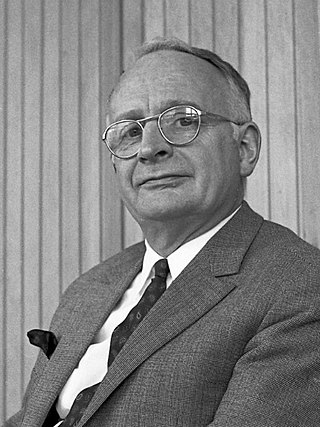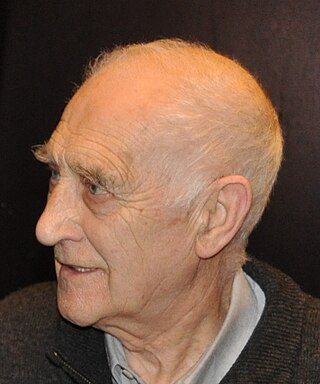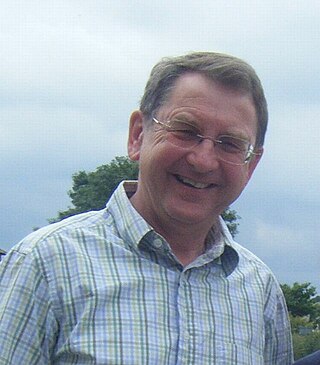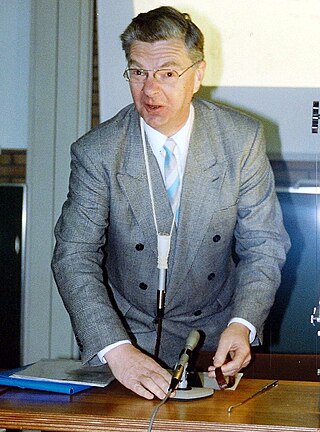Related Research Articles
Andrey Petrovich Yershov was a Soviet computer scientist, notable as a pioneer in systems programming and programming language research.

Stephen Richard "Steve" Bourne is an English computer scientist based in the United States for most of his career. He is well known as the author of the Bourne shell (sh), which is the foundation for the standard command-line interfaces to Unix.

Adriaan "Aad" van Wijngaarden was a Dutch mathematician and computer scientist. Trained as a mechanical engineer, Van Wijngaarden emphasized and promoted the mathematical aspects of computing, first in numerical analysis, then in programming languages and finally in design principles of such languages.

Nobuo Yoneda was a Japanese mathematician and computer scientist.

Friedrich Ludwig "Fritz" Bauer was a German pioneer of computer science and professor at the Technical University of Munich.
John Edward Lancelot Peck was the first permanent Head of Department of Computer Science at the University of British Columbia (UBC). He remained the Head of Department from 1969 to 1977.
Barry James Mailloux obtained his Master of Science (M.Sc.) in numerical analysis in 1963. From 1966, he studied at Amsterdam's Mathematisch Centrum under Adriaan van Wijngaarden, earning a Doctor of Philosophy (Ph.D.) in 1968.
Richard Simpson Bird was an English computer scientist.
Lambert Guillaume Louis Théodore Meertens or L.G.L.T. Meertens is a Dutch computer scientist and professor. As of 2020, he is a researcher at the Kestrel Institute, a nonprofit computer science research center in Palo Alto's Stanford Research Park.
Thomas Stephen Edward Maibaum Fellow of the Royal Society of Arts (FRSA) is a computer scientist.

Willem Louis van der Poel is a Dutch computer scientist, who is known for designing one of the first computers to be designed in the Netherlands, the Zeer Eenvoudige Binaire Reken Automaat (ZEBRA), translated as Very Simple Binary Automatic Calculator.
Charles Hodgson Lindsey was a British computer scientist, most known for his involvement with the programming language ALGOL 68.

Roland Carl Backhouse is a British computer scientist and mathematician. As of 2020, he is Emeritus Professor of Computing Science at the University of Nottingham.
Charles Carroll Morgan is an American computer scientist who moved to Australia in his early teens. He completed his education there, including a Doctor of Philosophy (Ph.D.) degree from the University of Sydney, and then moved to the United Kingdom in the early 1980s. In 2000, he returned to Australia.

Jeremy Gibbons is a computer scientist and professor of computing at the University of Oxford. He serves as Deputy Director of the Software Engineering Programme in the Department of Computer Science, Governing Body Fellow at Kellogg College and Pro-Proctor of the University of Oxford.
Eiiti Wada is a computer scientist and emeritus professor at the University of Tokyo and the Research Director of Internet Initiative Japan (IIJ), a computer network technology company. He is one of the creators of the Happy Hacking Keyboard.
IFIP Working Group 2.1 on Algorithmic Languages and Calculi is a working group of the International Federation for Information Processing (IFIP).
Conor McBride is a Reader in the department of Computer and Information Sciences at the University of Strathclyde. In 1999, he completed a Doctor of Philosophy (Ph.D.) in Dependently Typed Functional Programs and their Proofs at the University of Edinburgh for his work in type theory. He formerly worked at Durham University and briefly at Royal Holloway, University of London before joining the academic staff at the University of Strathclyde.
Charles Abraham Katz was an American mathematician and computer scientist known for his contributions to early compiler development in the 1950s.

Michel Sintzoff was a Belgian mathematician and computer scientist.
References
- 1 2 3 Hehner, Eric C. R. (3 May 2020). "Eric C. R. Hehner". Department of Computer Science. University of Toronto . Retrieved 2020-07-27.
- ↑ Jeuring, Johan; Meertens, Lambert; Guttmann, Walter (2016-08-17). "Profile of IFIP Working Group 2.1". Foswiki. Retrieved 2020-10-16.
- ↑ Swierstra, Doaitse; Gibbons, Jeremy; Meertens, Lambert (2011-03-02). "ScopeEtc: IFIP21: Foswiki". Foswiki. Retrieved 2020-10-16.
- Hehner, E. C. R. (1984). "Predicative Programming". Communications of the ACM . 27 (2): 134–151. doi: 10.1145/69610.357988 . S2CID 11577076.
- Hehner, E. C. R. (1990). "A Practical Theory of Programming". Science of Computer Programming. 14 (2–3): 133–158. doi: 10.1016/0167-6423(90)90018-9 .
- Hehner, E. C. R. (2004). "From Boolean Algebra to Unified Algebra". Mathematical Intelligencer . 26 (2): 3–19. CiteSeerX 10.1.1.638.1782 . doi:10.1007/BF02985647. S2CID 61678587.
- Hehner, E. C. R.; Horspool, R.N.S. "A new representation of the rational numbers for fast easy arithmetic" (PDF).
{{cite journal}}: Cite journal requires|journal=(help)